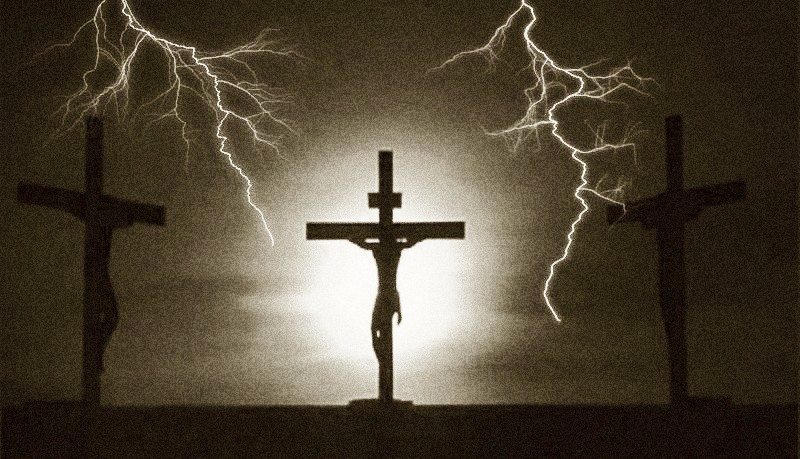

How is it that Good Friday should somehow stand on the bitterest and yet sweetest brink of all human history? Are we not deeply ashamed that we have in our own lives abandoned Him, have turned course and denied Him in our actions, and have in that sense cried out in our pain and confusion, "Crucify Him!" Yet, are we not keenly aware that we stand on the threshold of His victory — over Satan, over sin, over death — all for our sakes? What is this strange place we call Good Friday? It is neither here nor there, for it fits into no category that we could conceive. It sets the mind spinning as our hearts break and yet our minds look ahead to Easter. In some faint way, we begin, in our own many repetitions of the Church Year, to get some modest glimpse into God's perspective as He sees every moment of time at once, yet is present to us in one holy minute after another in our timebound world.
Jesus' last words on the Cross, according to St. Mark and St. Matthew, stand insistently on this point of two places: of sorrow and victory, of despair and exultation, of grieving and rejoicing, each felt in equal measure deeply. How is it that we can experience our deepest sorrow and our most greatest joy in the self-same moment?
Many Biblical commentators explain Jesus' despair in Gethsemane by pointing to the fullness of His humanity, which they see echoed in the words, "My God, my God, why has Thou forsaken me?" But I see Him on the Cross as being very God of very God. For His last words to us in these Gospels are the name of a well-known Psalm, Psalm 22, which He invokes by uttering its four first words. This is something everybody did and still does. Jews of His time, for example, would refer to their greatest prayer by uttering a single word: Shema, "Hear, O hear Israel!" To this day, our Psalms are named for their opening words. Open the Book of Common Prayer,, and you will see that Ps 22 is called the Deus, Deus Meum, "My God, My God":
|
My God, my God, why has Thou forsaken me
and why art Thou so far from from helping me. |
The sordid details of His death are told and retold in this song written many centuries before His birth:
|
For dogs have compassed me: the assembly of the wicked
have inclosed me: they pierced my hands and my feet. I may tell all my bones: they look and stare upon me. They part my garments among them and cast lots upon my vesture. |
|
I will declare Thy Name unto my brethren: in the midst of the
congregation will I praise Thee. Ye that fear the LORD, praise Him; all ye the seed of Jacob, glorify Him; and fear Him, all ye the seed of Israel. For He hath not despised nor abhorred the affliction of the afflicted; neither hath He hid his face from Him; but when He cried unto Him, He heard. |
Then, midst this inner joy, which nails and lances cannot touch, He issues, in the final lines of the Psalm, a proclamation, a Divine fiat, written ages ago through men moved by the Holy Spirit. In the moment of His greatest human weakness, we declares absolute sovereignty:
|
All the ends of the world shall remember and turn unto the LORD:
and all the kindreds of the nations shall worship before thee. For the kingdom is the LORD's: and He is the governor among the nations. ... all they that go down to the dust shall bow before Him: and none can keep alive His own soul. A seed shall serve him; ...They shall come, and shall declare his righteousness unto a people that shall be born, that He hath done this. |
What is this? What is this great act foretold ages before our Lord's nativity? Is this not the whole story of Good Friday, set down in Psalm 22, the Psalm of the Cross? A story that He holds before them (and us) at the point of His death? A tale that begins in despair, unfolds in woe, and then culminates in joy and victory?
And who are those people prophesied in this ancient and strange song? Who is that generation that would live to see "the ends of world ... turning unto the Lord?" And who are those people yet to be born who declare His righteousness? Is it not us? Do we not, even now, stand on the bitterest yet sweetest moment of our lives? Amen.